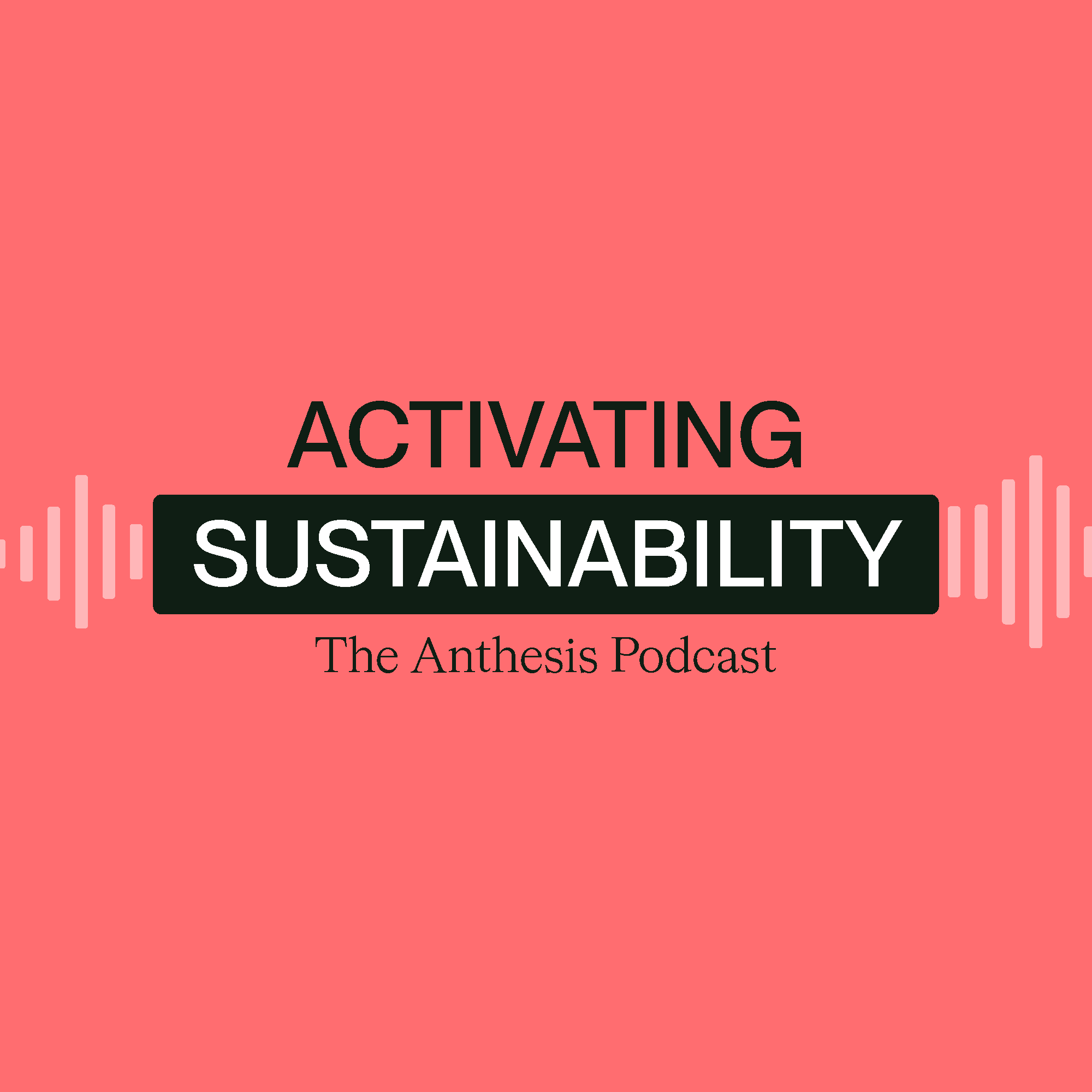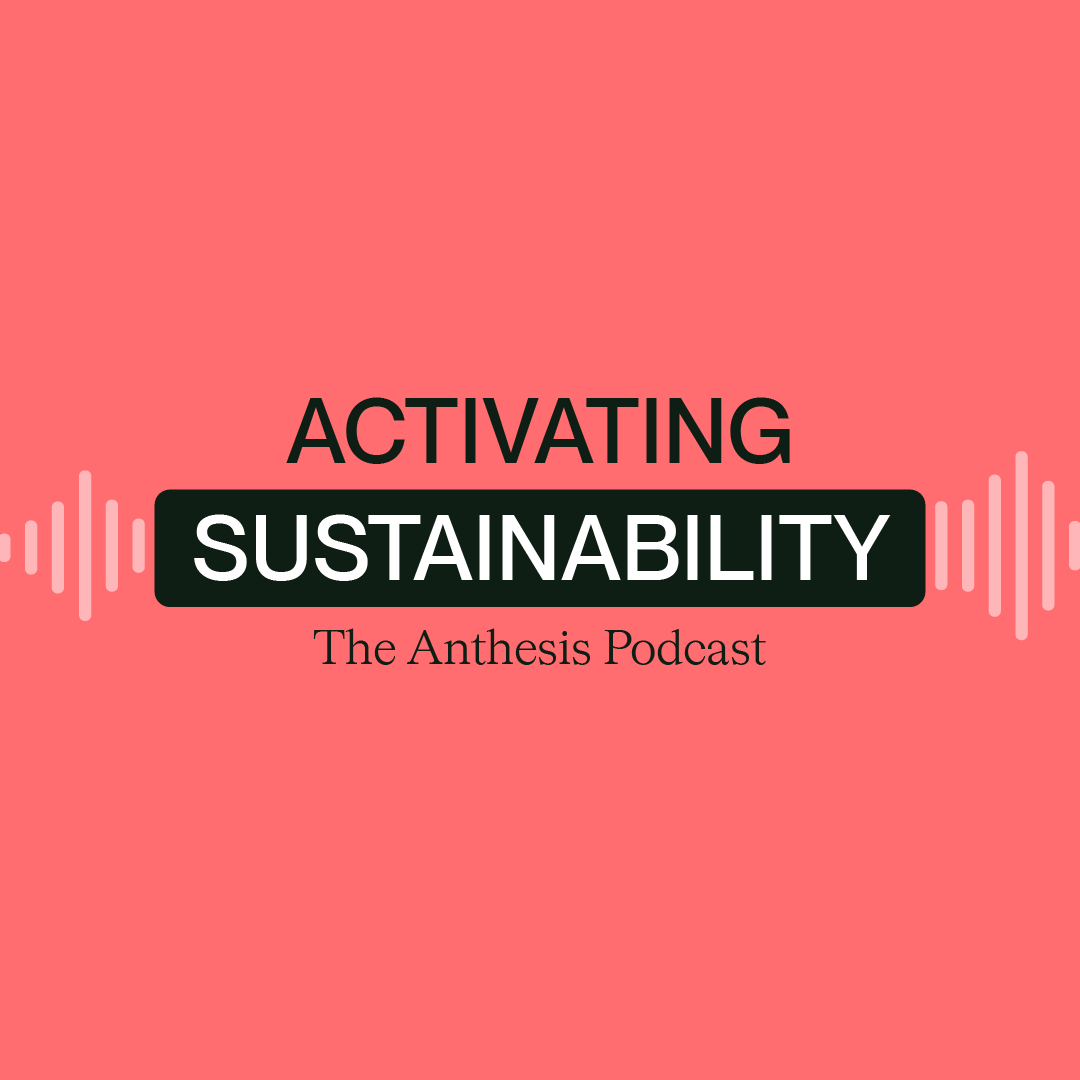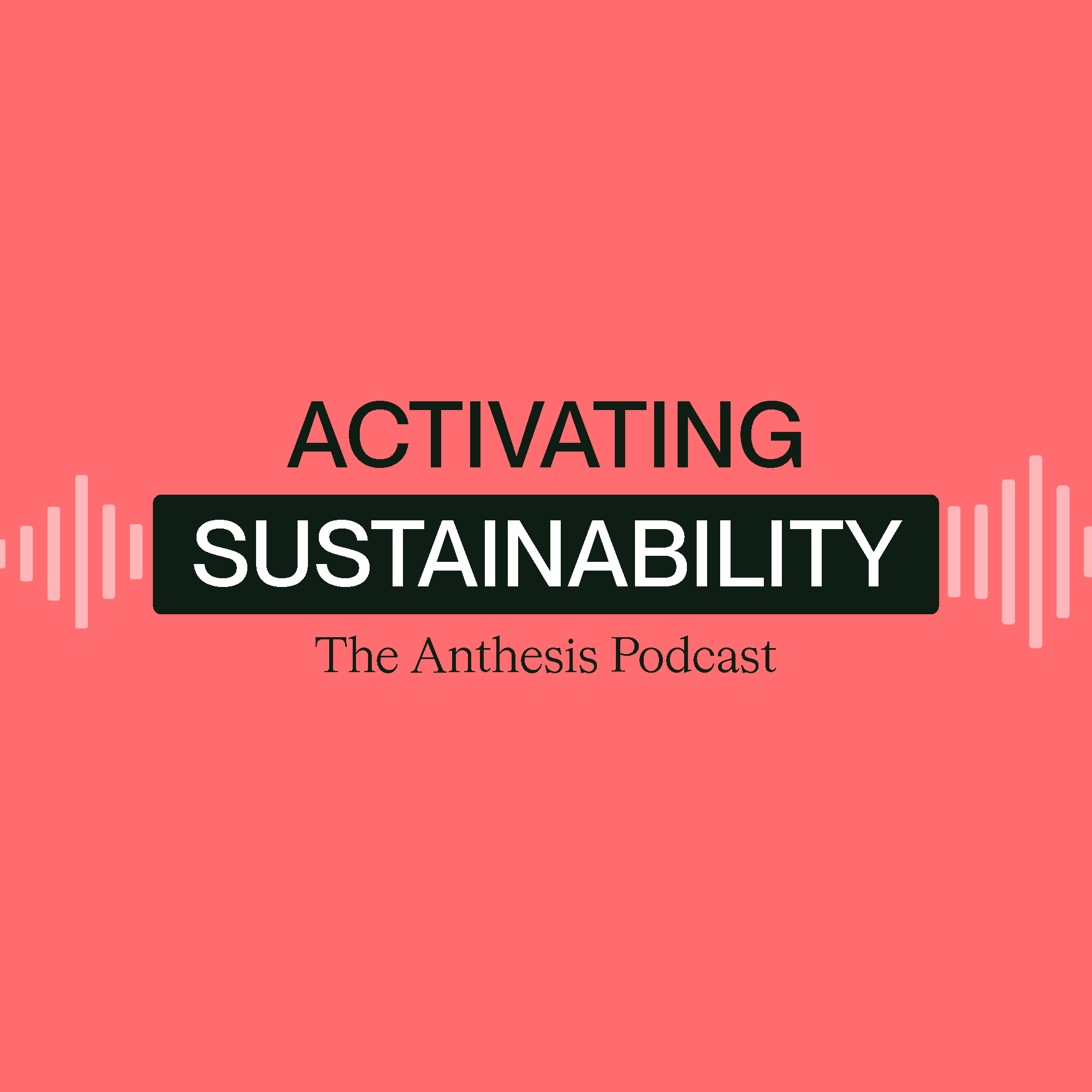Episode Transcript
[00:00:00] Speaker A: Foreign.
[00:00:07] Speaker B: Hello and welcome to Activating Sustainability, the Anthesis Podcast. I'm your host, Chris Peterson. Last week at Climate Week in New York City, we stood up Anthesis Inspiration House, our two day activation to hold space for Momentum. We hosted 11 dynamic sessions with nearly 400 attendees, all working towards collaborative solutions and bold action across climate, nature and equity.
On today's Just in podcast, I'm speaking with some of our Anthesis colleagues who were there at the Inspiration House as well as the other Climate Week events. Justin Uiola, who co leads our Climate and nature service here in North America. Barry Lawson, who leads our transaction and sustainable finance team, who works primarily with private equity and other private market investors. And Allison Gilbert, who leads our water stewardship within the Climate and Nature team. Thanks so much for joining.
[00:00:56] Speaker C: Pleasure to be here.
[00:00:57] Speaker D: Thanks for having me.
[00:00:58] Speaker B: So maybe to start, we'd love to hear if there was a question or questions that each of you were going into Climate Week wanting answered and what did you find? Justin, do you want to kick us off?
[00:01:11] Speaker D: Absolutely. The biggest question I had coming into this was around the sentiment that corporations have given the current political environment we find ourselves in. Was also curious to find out whether there'd be any new guidance, standards or announcements being released.
[00:01:24] Speaker B: Awesome. And what did you find?
[00:01:27] Speaker D: So a couple of key themes kind of came out here. One is that sustainability today is harder than it's been for a number of years with an increased focus on financial ROI and other values such as health or resilience from a consumer and customer perspective. And so really we're burying the lead for climate here. But overall this isn't really new. Right. We've had to focus on sustainability and ROI for quite a few years outside of those boom years of 2020 to 2020, folks were able to make large commitments. And so what we really see now is a rebalancing between that greenwashing heavy focus on communications down to green hushing and really trying to get the story right. But as we've noted in our Cost of Science report, there really is an optimal position to unlock sustainable performance and those who overshoot on either side are really leaving financial value on the table. And that showed up a lot at Climate Week.
[00:02:19] Speaker B: Awesome. I'm keen to dig in on what was the like so time bars and discussions and kind of that overall sentiment. But maybe Barrett, do you want to share what you were looking for going into the week and what you found?
[00:02:30] Speaker C: Yeah, I mean, I think similarly to Justin, I was really interested and looking forward to get to spend time with a lot of clients and colleagues and get a sense of sort of where people are at. I focus primarily working with financial institutions, asset managers, mostly around in the private equity space.
And so they've been facing a lot of headwinds with anti esg actions being taken at the federal level, the state level, state pension funds, et cetera. So just trying to figure out where things are at. And I think that my overall sense is that for the managers that came at this reluctantly, maybe they're taking advantage to pull back slightly. But I think for those that really view this as value creation and protection opportunity, as we certainly do here, they're still moving forward and making progress and keeping their heads down.
[00:03:25] Speaker B: Awesome.
[00:03:25] Speaker A: And Allison, yeah, thank you. Totally agree on those companies that really do have been focused on value creation and protecting the resilience of their supply chains. I went into Climate Week really curious how nature and water were going to show up in conversations this year. As the climate changes, Its effects are mostly felt most immediately through water, whether that's too little or too much. And whereas climate can be polarizing, we everyone was sensitive to that this year. Water and its effects on business are often tangible and not political. And so what I really observed this year was an emphasis on businesses dependencies on nature. $44 trillion of the global economy is dependent on nature, whether directly or indirectly. And the food and beverage and life sciences companies have known this for some time. But at Clande Week, there's really increasing recognition that other industries need support from nature services too. So a key message I kept hearing was, and if you're beginning your sustainability journey or your exploration into nature, for companies to start asking their leadership a very basic question of how is our business really dependent on nature? Many need clean and sufficient water to use in their manufacturing operations or data center cooling. Food and cotton farmers need water and healthy soil and healthy pollinators to get good yields for their crops. And so for nature, once those systems that we rely on for our businesses and our value chains, once those systems collapse, they're gone. There was an example of a seafood company that's really dependent on sourcing from the North Sea. And if that ecosystem collapses, that puts a quarter of their business at risk. So my key takeaway this year was really that leading companies are seeing that nature is essential for their future strategy for more resilient supply chains.
[00:05:15] Speaker B: Fantastic. Yeah, it's exciting to see organizations waking up to those embedded risks within. Now I know climate change is both a marathon and multiple sprints and fairly exhausting. And so now we're going to ask the unpopular, challenging question of if you were to consolidate it down into some of the key themes, discussion points, sidebars, et cetera, that you had with people or participating in over the week, what were some kind of big buckets that jumped out. And I know, Justin, you kind of started talking about some of that value creation and tie back to roi. Was that one that you heard a lot about?
[00:05:51] Speaker D: Absolutely. That was one of the major themes we heard for sure throughout the entire week. Another one was around really the shift in focus, both from a mitigation to an adaptation lens, as we talked about a bit, recognizing that the climate and changes to the climate are here now and that businesses are facing much of those challenges, but also that we're seeing a shift from budgets going mostly to consulting data, really, to moving into strategy and decarbonization. However, there was some pushback in certain segments where a lot of companies are having to today park a lot of those efforts to focus on compliance. So we're seeing a bit of a, again, straddling the nuance here to find the right actions to move forward.
[00:06:34] Speaker C: Yeah, I mean, I think the, as you sort of teed up in your prior question, the, the focus on ROI and value creation was really a core theme for my private equity clients and making sure that they are really driving everything that they do around value creation. They're able to articulate the value levers that they're going to be accessing by different initiatives, etc. And that helps them both with their own internal teams to get traction on a bunch of these different initiatives. And it also helps to communicate to some of their key stakeholders as to why they're doing things. And to always be able to point to value is, is a shield against maybe some of the potential attacks that they might face.
[00:07:19] Speaker A: And maybe I'll pick up on that word collective. I in a lot of the sessions I was attending and heard this from colleagues too, that we just kept hearing about the importance of collective action and collaboration. Again, coming with that nature perspective. Nature and water are local issues, local challenges. And in a given region, your water supply is only as secure as the collective use of that water. And so if companies kept coming back to like, we can use it as efficiently as we want, we can have strong water or nature stewardship practices. But if a factory down the road is not doing that, then we haven't managed our, our water and nature risks for our businesses and the surrounding communities. You can't say it's clean fish in a dirty pond was one of those lines so we heard about many companies that are really taking up more responsible water and nature practices in their operations and also outside their own factory or direct operations walls doing water replenishment or nature related projects to really help build the resilience of those ecosystems that their businesses depend on. And that's where collective action really comes in. Because if your supply chain is in the same region as competitors, you collectively have a larger impact in those areas and you have the same dependencies on those resources, same risks and opportunities. And so you all share an interest in operating in a healthy watershed or healthy ecosystem. And that can also be true for other companies from other sectors and other local stakeholders too. So where different actors might have different reasons that they are dependent on nature and water and the ways that they're impacting it, there's this shared goal of a healthy ecosystem. And so that opens up real tangible opportunities for partnering to replenish or conserve those ecosystems. And we similarly heard a lot about this from regenerative agriculture. Farmers want healthy yields. Food brands want to might source from the same farmers along the supply chain data centers. The companies that run them are really eager to fund water replenishment projects for their own longevity and license to operate.
Municipalities care about agricultural runoff and water quality. So all of these multiple players with different perspectives across the value chain might all have a shared interest in improving water management on farm and that opens up opportunities for co financing, say regenerative agriculture programs to help improve it across the ecosystem.
[00:09:39] Speaker C: Alison, that's really interesting. It triggers something for me which was another takeaway that I had on that same topic of collaboration, but mainly perhaps maybe my space in the finance world versus your space in in water and nature. I sort of came away with with a different viewpoint, which was hearing from a lot of my clients that there's some hesitation and concern around some of the different industry initiatives that are taking place as those might be points of vulnerability for when it comes to sort of pushback on some of the ESG topics.
[00:10:14] Speaker B: Yeah, I was in a session with chief procurement officers two weeks ago and one of them summarized the current moment as it's complicating, which feels like it captures so much of what people are wrestling with at the moment. So I heard kind of that value creation, collaboration and collective action. And curious if there were some others that jumped out to you all as maybe some key themes.
[00:10:35] Speaker D: I can speak to one and actually hit on something that Allison said as well, which is around data centers and of course the buzzword of the moment which is AI particularly looking at both the upside of AI around driving sustainability progress forward through better data collection, collaboration connections, automating different processes and decarbonization strategies. But then also the risks around AI. Right. The need to co locate renewable energy, the amount of water use and energy use associated with this, and actually a resurgence of gas turbines. Then in certain locations where companies who are building data centers are just looking to get them operational and are going to have to make tough choices here around how do we power the energy needed for AI. And so we really are seeing again, a balance, a nuance that's needed to drive progress forward.
[00:11:25] Speaker A: Speaking of progress, I was just going to say one thing we kept hearing, it sounds generic, but we heard it in a dozen contexts is don't let perfection be the enemy of the good. Just starting to make progress is so essential and there are so many headwinds and sensitivities and collecting data can be so daunting. But whether it's building internal policies or setting up programs or partnerships, or doing that data collection, there was just this real encouragement from a lot of the panels. Just like don't let that daunting feeling get in your way. Many companies that start on the data collection journey, for example, realize that they actually have a lot more information internally than they realize, whether from corporate reporting or risk teams. There's a lot more integration and it helps the sustainability folks kind of untap what's known elsewhere in the organization. And you really, you can't wait for all of the data before you can start acting because that will stall you altogether. So there was a real focus on just kind of understand where you are so far, understand your dependencies and your footprint and your risks, and then start taking action from there, even if it's small steps.
[00:12:29] Speaker C: I'm not sure I would classify it as a theme, but one thing that I did take away from all the conversations that I had and the sessions were really sort of the difference in tone that maybe came from podiums versus what was ultimately what we heard with clients and colleagues when we were talking one on one with them. And not that the tone was, you know, the world is ending, but much more sort of realistic about headwinds that are being faced and sort of the reality of needing to buckle down and work a bit harder than we did during the, the boom years, as Justin referenced earlier.
[00:13:10] Speaker B: Yeah, so maybe just to wrap up, you know, we'd love to hear what is one or two takeaways that you would kind of offer to listeners to.
[00:13:19] Speaker D: To walk away with the key takeaway that I have here ultimately is that sustainability is maturing and we're seeing much more nuance and headwinds associated with that. And one of the great metaphors I heard in one of the sessions was that in facing those headwinds, we have to do what's called tacking. It's where you work diagonally against the headwinds in order to get upstream.
And we need to do that as sustainability professionals in order to keep forward progress. On the maturity side, I also think a lot of grocery stores and how there used to be a separate organic section where all the sustainable food items would be housed, and now we're seeing that being integrated into the ketchup aisle, where organic ketchup is right next to conventional ketchup. And so in the same way, we're seeing sustainability being woven into the fabric of organizations. And so with that nuance and maturity comes forward progress just not being talked about as much.
[00:14:17] Speaker C: Yeah, I think I'd just come back to the business case, be locked down, articulate the value, have the numbers behind what you're doing to really justify it and build momentum.
[00:14:29] Speaker D: Great.
[00:14:30] Speaker A: And Allison, my kind of two part takeaway overall, part one really was that it's not just talk and it's not just like sustainability, feel good. Nature risks have commercial realities behind them. And so there was so much emphasis around understanding your risk footprint, where you depend on nature, how you impact it, and that allows you to make the business case, get some of that data behind it, make the case for why you need to start taking action in order to be able to achieve commercial priorities. And then the second part of that takeaway was it's really important to know your opportunities associated with stewarding nature and water. So really underscoring that value creation can come from this.
And boards need to hear that the leader, the leaders of tomorrow are really going to be the ones that value the resilience of nature and realize that the resilience of their business depends on it.
[00:15:22] Speaker B: Well, thank you all so much for the time and insights. There's so much that happens in any Climate Week of any year, but especially this year. So I really appreciate you kind of jumping in and providing some perspective on what you saw and experienced. So thanks so much.
[00:15:35] Speaker A: Thank you for the time.
[00:15:36] Speaker B: Thank you and thank you for listening. At Climate Week, we hosted a number of events, including rolling out our latest research on the cost of silence. Please visit the anthesisgroup.com website where you can download the full report and access all of our post Climate Week resources. Thanks again. Take care.


